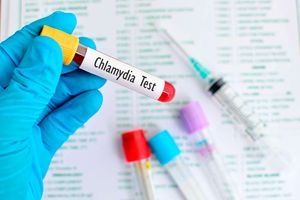Testing for syphilis made easier

Syphilis is typically transmitted through oral, vaginal, and anal sex, during pregnancy, or through blood transfusion.
What you need to know:
- In just 15 minutes users will be able to determine if they are positive or negative for syphilis.
- A positive result should prompt users to seek further confirmation from a healthcare provider.
You will soon be able to test for syphilis at home with the approval of the first-ever over-the-counter kit.
The kit, according to the researchers, offers a convenient and quick way for individuals to check for the sexually transmitted infection (STI) from the comfort of their own home.
The authorization by the United States Food and Drug Administration (FDA) is a significant shift from the previous requirement that the test can only be done by visiting a health facility.
With just a single drop of blood and a 15-minute wait, users can now quickly determine if they are positive or negative for syphilis.
Due to the stigma surrounding syphilis, many cases go untested, leading to serious complications down the line hence the benefits of the kit developed by the biotech company NOWDiagnostics.
However, the FDA emphasises that this home test is only the initial step for those who suspect they may have syphilis.
A positive result should prompt users to seek further confirmation from a healthcare provider, who can perform more comprehensive testing to ensure an accurate diagnosis.
The test kit according to the researchers will be accessible to everyone in the second half of 2024 at a price of about Sh3,763 ($29.98), making it both accessible and affordable.
Dr Michelle Tarver, the acting director of the FDA’s Center for Devices and Radiological Health while highlighting the importance of this advancement, stated that at-home testing can increase initial screenings, particularly for those hesitant to discuss potential STI exposure with their healthcare provider.
“This could lead to more lab-confirmed diagnoses, timely treatment, and ultimately, a reduction in the spread of the infection. The introduction of this at-home test is expected to be a game-changer, especially in reaching populations who may be at higher risk or reluctant to seek medical advice,” Dr Tarver said.
He adds: “We continue to see advancements in tests, particularly tests for sexually transmitted infections, which can give patients more information about their health from the privacy of their own home. Access to home tests may help increase initial screening for syphilis, including in individuals who may be reluctant to see their healthcare provider about possible sexually transmitted infection exposure,”
Syphilis is a preventable and treatable bacterial STI, but if left untreated, it can lead to severe health complications. Many individuals with syphilis may not notice any symptoms or might misinterpret them, making early detection crucial.
The infection is typically transmitted through oral, vaginal, and anal sex, during pregnancy, or through blood transfusion. When syphilis occurs in pregnancy, it can result in stillbirth, newborn death, or congenital syphilis, a condition where the baby is born with the infection.
In Kenya, syphilis is frequently grouped with other STIs such as HIV, chlamydia, and gonorrhea, which can lead to insufficient attention to the specific threat it poses.
A study by the National AIDS and STI Control Programme (Nascop) found higher STI prevalence among people who inject drugs compared to the general population, with syphilis affecting 1.7 percent of this group. Chlamydia affected 4.2 per cent, while gonnorhoea affected 1.5 per cent of this population.
The WHO estimated that in 2022, eight million adults aged between 15 and 49 acquired syphilis. Some countries have reported a significant increase in syphilis cases, particularly among men who have sex with men.
WHO also reported 700,000 cases of congenital syphilis worldwide in 2022, leading to an estimated 150,000 early fetal deaths and stillbirths, 70,000 neonatal deaths, and 115,000 infants born with clinical signs of congenital syphilis.
WHO also reports that certain population groups are disproportionately affected by syphilis. For instance, about 7.5 per cent of gay men and other men who have sex with men are estimated to have syphilis, compared to just 0.5 per cent of men in the general population.
According to the World Health Organisation (WHO), syphilis is a bacterial sexually transmitted infection (STI) that remains a significant public health concern despite being both preventable and curable. Left untreated, syphilis can lead to severe health complications,
The International Health Agency notes that the most challenging aspect of syphilis is its ability to go unnoticed.
“Many individuals infected with syphilis show no symptoms or fail to recognize them, allowing the disease to persist and progress silently. Syphilis is primarily transmitted through oral, vaginal, and anal sex, but it can also be passed from mother to child during pregnancy, leading to stillbirth, newborn death, or congenital syphilis, where the baby is born with the infection,” says the WHO.
For babies born with syphilis, the consequences can be devastating. They may suffer from rashes, organ inflammation, anemia, bone and joint problems, and neurological conditions such as blindness, deafness, and developmental delays. Some symptoms may not become apparent until later in life.





